
JACKSON, Tenn. (BP)–In response to President Bush’s announcement Aug. 9 to allow limited federal funding of embryonic stem cell research, medical ethicist E. David Cook of Oxford University said he is pleased but concerned about the U.S. leader’s pronouncement.
“I thought it was a very clever political move,” said Cook, the spring 2001 scholar-in-residence at Union University in Jackson, Tenn. Cook added that he was glad the importance of life had been reaffirmed but fearful of what doors will open as a result.
Bush, in deciding that federal funding should be allowed for 60 existing stem cell lines derived from embryos that have already been destroyed, recapped both supporting and opposing arguments, and focused on two questions:
“First, are these frozen embryos human life, and therefore, something precious to be protected? And second, if they’re going to be destroyed anyway, shouldn’t they be used for a greater good, for research that has the potential to save and improve other lives?”
Cook, an Oxford University fellow and chaplain, said the president’s decision to allow federal funding where “the life and death decision has already been made” needs to go much further.
“I think there’s a difference between federal funding and federal regulation,” he explained. “There’s no clear mechanism for regulating what scientists do [in the U.S.]. In the United Kingdom, we’re very concerned about controlling the actual practice of scientists — we’ve seen good examples of what can happen without regulations in the news this week,” he said, referring to scientists’ announced intention to pursue human cloning.
Whether 60 stem cell lines will be acceptable for scientists to work with will depend on whether the new presidential council to monitor stem cell research can “show a genuine need for more stem cells and whether science will actually deliver,” Cook said.
Though millions of people suffering from the harsh affects of genetic diseases like Parkinson’s and Alzheimer’s are hopeful that this research will bring quick cures to their illnesses, Cook said the “optimistic hype that has been created on what scientists are offering” will bring disappointment in the long run.
“We’ve been promised a cure for AIDS for years — scientists are offering a kind of ‘kiss and a promise’ with the stem cell research,” said Cook, who believes that producing an actual cure for genetic disease is still “millions of miles away.”
“People suffering today aren’t going to benefit from this research in this generation — it will take at least a generation — if it works at all.”
While Cook is glad that Bush was careful not to give ground in terms of taking human life, he said that the question society must now face is what should be done when human life has already been taken, as in the case of embryos which have already been destroyed.
“In China, they are now cross-matching individuals needing organ transplants with prisoners waiting to be executed. When a match is found, the execution is moved up so the organ can be used,” said Cook, who questioned whether human beings should be used in that way, benefiting other human beings.
“As Christians, we should be part of government’s rule of restraining evil and reinforcing good,” said Cook, acknowledging that Bush’s limited funding is in some ways an attempt to restrain evil. “We also have to be willing to proclaim God’s standard. He created human life for a special purpose and we need to show by our actions that we also regard human life as special.”
–30–
(BP) photo posted in the BP Photo Library at http://www.bpnews.net. Photo title: E. DAVID COOK.

















